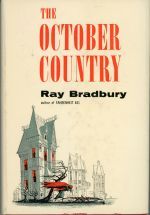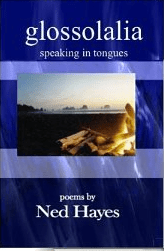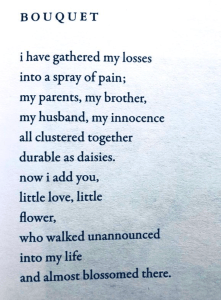Ned Hayes's Blog, page 3
October 10, 2020
Bookstores: Denver's Delicious BookBar
Read my books at BookBar
Read more BOOKSTORE POSTS

I’m excited that Denver’s wonderful BookBar is re-opening on October 11, 2020, after a summer of sad pandemic closure. (The store, of course, is re-configuring itself for pandemic-safe browsing.)
BookBar is a fantastic all-six-senses bookish experience. For work last year, I had to travel often to the Denver area, and whenever I was in the vicinity, I made a point of spending a lovely evening at this marvelous bookstore.
BookBar is a unique place in the book world. It’s a very nicely curated independent bookstore that features both Colorado authors and American literature alongside a bevy of hand-selected books from around the world. Yet their lovely shelves are coupled with a full-service kitchen that includes a fabulous wine selection and a beautifully plated hors-d’oeuvres and salad menu that lends itself to a lovely evening of books, drinks and communal gathering.
The BookBar has cultivated their community during our recent season of discontent by actively engaging with the BLM movement, and by confronting white supremacy directly. I am so proud to be part of this literary community, even from a distance.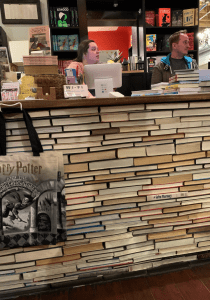
BookBar is located in the Tennyson Street arts district of Denver, Colorado, and it is one of the anchor locations that makes the Tennyson Street such a draw for artists and arts lovers. When we don’t have to socially distance, BookBar hosts frequent author events on-site, and is a fantastic outdoor patio and even a story time for pre-schoolers three times a week. I’ve attended numerous poetry and essay readings myself at the BookBar over the past few years, and each time, I wish I had a version of the BookBar in my own Portland neighborhood!
As their website indicates, the idea of combining a book store and wine bar came to BookBar owner, Nicole Sullivan, like a bolt of lightning one day while reading a book and drinking a glass of wine. Who among us does not like wine and books and books with wine? About a dozen years later, after meandering through a few different careers, culinary school, marriage and motherhood, BookBar began to take shape.
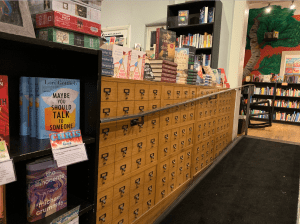 Sullivan became interested in not only the concept of combining books and wine but also creating a community gathering space where it is not just accepted but encouraged, to lounge and read or meet and discuss; to take time to slow down and share food, drink, the written word (in whatever form) – to savor the good things in life.
Sullivan became interested in not only the concept of combining books and wine but also creating a community gathering space where it is not just accepted but encouraged, to lounge and read or meet and discuss; to take time to slow down and share food, drink, the written word (in whatever form) – to savor the good things in life.
My experience of the BookBar has been exactly this — a fantastic place to enjoy the good things in life, especially the written word. Just to wrap up this little paean of praise, it’s worth noting that BookBar‘s main counter is made of actual books (see photo to the right) , and their main hallway is graced by a library’s discarded card catalog — a fond memory for any book lover! (Also see the card catalog hallway to the right) This is truly a literary gem, and I’m so glad BookBar is back in the world.
Pinterest – Ned Hayes Bookstore Board
Pinterest – Ned Hayes Bookstore Board
Bookstores: Denver’s Delicious BookBar was originally published on Ned Hayes
September 30, 2020
The October Country
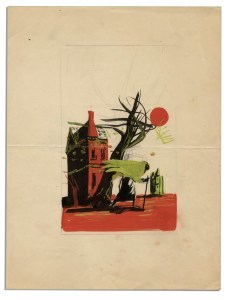 “October Country … that country where it is always turning late in the year. That country where the hills are fog and the rivers are mist; where noons go quickly, dusks and twilights linger, and mid-nights stay. That country composed in the main of cellars, sub-cellars, coal-bins, closets, attics, and pantries faced away from the sun. That country whose people are autumn people, thinking only autumn thoughts. Whose people passing at night on the empty walks sound like rain… .”
“October Country … that country where it is always turning late in the year. That country where the hills are fog and the rivers are mist; where noons go quickly, dusks and twilights linger, and mid-nights stay. That country composed in the main of cellars, sub-cellars, coal-bins, closets, attics, and pantries faced away from the sun. That country whose people are autumn people, thinking only autumn thoughts. Whose people passing at night on the empty walks sound like rain… .”
― Ray Bradbury, The October Country
The October Country was originally published on Ned Hayes
September 17, 2020
Poem: New Year
Rosh Hashanah – Sept 18 thru Sept 20 2020
new year.
Ned Hayes
Rosh Hashanah comes
this year
on a day of cool wind,
a breathtaking
portent of winter
taking the world, rude lover
tossing[image error]
the sheets away.
in autumn
the sadness of all things
is greatest
for now
the world was created.
the new fruit, shot through
with decay:
birthed in the same
moment,
the racing seed and
the worm.
published in Twig, Seattle Washington
[image error]
[Read more Poetry Posts]
Poem: New Year was originally published on Ned Hayes
September 10, 2020
Nabakov's Writing Process
I loved reading about Vladimir Nabakov’s writing process… intriguing to see inside the master’s work habits and see how he acted like a magpie and a chaotic creative coming closer and closer to a final story. This process of collection and collation and creativity has been very similar to my process in my last few novel writing adventures.
 Vladimir Nabakov
Vladimir Nabakov
All I know is that at a very early stage of the novel’s development I get this urge to collect bits of straw and fluff, and to eat pebbles. Nobody will ever discover how clearly a bird visualizes, or if it visualizes at all, the future nest and the eggs in it. When I remember afterwards the force that made me jot down the correct names of things, or the inches and tints of things, even before I actually needed the information, I am inclined to assume that what I call, for want of a better term, inspiration, had been already at work, mutely pointing at this or that, having me accumulate the known materials for an unknown structure.
After the first shock of recognition—a sudden sense of “this is what I’m going to write”—the novel starts to breed by itself; the process goes on solely in the mind, not on paper; and to be aware of the stage it has reached at any given moment, I do not have to be conscious of every exact phrase. I feel a kind of gentle development, an uncurling inside, and I know that the details are there already, that in fact I would see them plainly if I looked closer, if I stopped the machine and opened its inner compartment; but I prefer to wait until what is loosely called inspiration has completed the task for me.
There comes a moment when I am informed from within that the entire structure is finished. All I have to do now is take it down in pencil or pen. Since this entire structure, dimly illumined in one’s mind, can be compared to a painting, and since you do not have to work gradually from left to right for its proper perception, I may direct my flashlight at any part or particle of the picture when setting it down in writing. I do not begin my novel at the beginning, I do not reach chapter three before I reach chapter four, I do not go dutifully from one page to the next, in consecutive order; no, I pick out a bit here and a bit there, till I have filled all the gaps on paper.
This is why I like writing my stories and novels on index cards, numbering them later when the whole set is complete. Every card is rewritten many times. About three cards make one typewritten page, and when finally I feel that the conceived picture has been copied by me as faithfully as physically possible—a few vacant lots always remain, alas—then I dictate the novel to my wife who types it out in triplicate.
Nabakov’s Writing Process was originally published on Ned Hayes
August 27, 2020
KING DONALD: a comedy?
 “This low-rent Lear raging on his Twitter-heath has proven that the phrase malignant buffoon is not an oxymoron.”
“This low-rent Lear raging on his Twitter-heath has proven that the phrase malignant buffoon is not an oxymoron.”— George F. Will, The Washington Post
———————-
The perfectly satirical story of our age, King Donald is the shockingly prescient story of our time, a ripped-from-the-headlines lampoon of both William Shakespeare and our national politics.
THE EXPERIENCE
A rollicking production that lifts all the best lines from Shakespeare’s classic dramas and weaves them into the most bizarre political tale of our age, King Donald is an entertaining romp through the true-to-life surreal story. This staged play is sure to be enjoyed by political aficionados, fans of William Shakespeare and devotees of “The Capitol Steps,” alongside the crazed fans of such personages as Hillary Clinton, Kellyanne Conway, Michael Cohen, Robert Mueller and James Comey (all of whom appear on stage).
THE STORY
The faithful story of a young scion, raised to wealth and nurtured by dissolute amoral mentors, among them the Falstaffian Roger Cohn. A playboy who rises in prominence even as he fails at business. A man enchanted by lewd youth, yet brought to the political forefront, who strives always to hail his larger purpose as Prince Hal and confront his corporate masters, in Hamlet’s own voice. A man who is at last exalted to prominence in the empire’s politics, where he is led astray by advisors both heraldic (Conway) and traitorous (Cohen) and ends his life wandering in a twitter storm, entertained by a pitiful fool, Roger Stone.
PLAYWRIGHT
Playwright Kate Ayers was the co-founder of the Indianapolis Children’s Theatre and has created educational theater programs nationwide. She is the writer of over 200 plays, and her plays have appeared on over 300 stages across the globe. La Casa Azul, her musical based on the life of Frida Kahlo, was featured in a world premiere in 2019 and will go on national pre-Broadway tour in spring 2021. The PBS documentary of the La Casa Azul production won an Emmy in 2017. Ayers ran the Theater Program at the Indiana Women’s Prison for 10 years, studied at the Goodman Theatre School and graduated from Columbia (Directing).
PLAYWRIGHT (AND PRODUCER)
Playwright and Producer Ned Hayes wrote and produced the 8-hour-long production of John Milton’s Paradise Lost in Seattle in collaboration with the Washington Center for the Book, which featured actors from Seattle Rep, Intiman, Seattle Opera and University of Washington. He has written and produced plays for a variety of stages for ten years. He holds an MFA and an MA, with a focus on medieval drama and Shakespearean studies. Four of his novels have been published, and his novel The Eagle Tree was a national bestseller, nominated for the National Book Award and the ALA Book Award. The Eagle Tree was adapted by Kate Ayers for the stage and screen in 2018.
PLAYWRIGHT 3: AN APOLOGY TO SHAKESPEARE
William Shakespeare is the prominent English playwright of the 1500s, who would shrink from claiming any responsibility for this riotous travesty of his work, as his plays were absolutely rifled and routed and spectacularly disassembled for the purposes of a narrative that has absolutely nothing to do with his original intent. Except, surprisingly, Shakespeare’s original scenes work nearly unedited in King Donald! If you love Shakespeare, you’ll find much to enjoy in this ribald and uproarious production.
THE SOURCES
The playwrights are both expert in Shakespearean drama, and have both performed Shakespeare’s plays on numerous stages nationwide. King Donald contains much original material, but also adapts and reconstructs moments and famous storylines from all of the following Shakespeare plays to create one seamless and hilarious staged narrative: Hamlet, Richard II, Romeo and Juliet, Henry IV Part 1, Henry IV Part 2, Henry V, Henry IIIV, Merchant of Venice, Julius Caesar, Titus Andronicus, MacBeth, King Lear,
Taming of the Shrew, Cymbeline, Merry Wives of Windsor, As You Like It, Much Ado About Nothing
SEEKING PRODUCTION PARTNERS
The team who created King Donald is seeking production partners at this time for a national premiere and a national tour, both to take place prior to the U.S. presidential election of 2020.
KING DONALD: a comedy? was originally published on Ned Hayes
August 23, 2020
Eagle Tree Book Review: Dragonfly
New Book Review by Dragonfly.Eco: an exploration of eco-fiction
The Eagle Tree by Ned Hayes (Little A, 2016)
Young adult contemporary fiction
Review by Kimberly Christensen
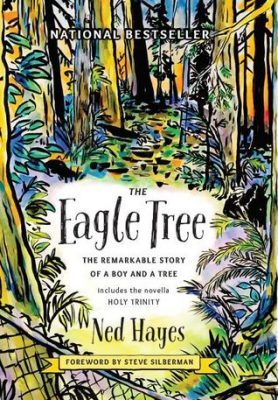 To say that fourteen-year-old March Wong loves trees is an understatement. He climbs multiple trees per day and can cite endless amount of information about trees, from information about their species to how trees work to protect the environment.
To say that fourteen-year-old March Wong loves trees is an understatement. He climbs multiple trees per day and can cite endless amount of information about trees, from information about their species to how trees work to protect the environment.
March is also autistic and struggles to understand why other people don’t care as deeply about trees as he does. He shares his wealth of tree-knowledge in order to build connections with those around him, but that information is often not met with enthusiasm or reciprocation by those around him. Every time someone fails to respond with interest to March’s tree facts, his aversion for social interactions is reinforced.
In Olympia, Washington, where March resides, there is an abundance of trees to explore. After moving to a new neighborhood, March discovers an old growth tree called The Eagle Tree, which hosts nesting bald eagles each spring. Once he sees the tree, March must climb it, even though his mother forbids it because March has a history of falling out of trees.
His mother’s caution does not dissuade March, who figures out how to get to the tree on his own. However, he discovers that the land that the tree sits on had been sold and may be developed. This news is so upsetting to March that it causes some amount of regression in the progress he has made with impulse control and behavioral modifications. That regression has the potential to impact his future, as a previous incident resulted in March being hospitalized. Due to that incident, his single-mother’s ability to care for March is being investigated by Child Protective Services, which might decide to remove March from his home.
March figures out that he can advocate for the protection of the tree and receives support to do so. This advocacy challenges him to his core, yet also provides him to opportunity to connect with other people who loves trees – and with people who don’t necessarily love trees but have their own gifts to offer if March can learn to receive them. This growth helps the child services investigation to resolve in a way that’s positive for March and his mother.
The Eagle Tree is really a devotional to trees and their importance to our planet. It is full of amazing information about trees and demonstrates a deep understanding of their foundational importance to life. While March’s story is interesting and provides a well-written opportunity to explore a neuro-atypical experience of environmental activism, the first-person point-of-view, limits the reader’s ability to get emotionally invested in the story. March doesn’t care about many people in a traditional sense, so there’s almost no character development outside of March. Everyone besides March feels very peripheral to the story, and March himself is not easy to root for because he is so analytical. There are moments of emotional growth – such as his friendship with a classmate called Stig – that are lovely, but these are too few and far between.
Additionally, there’s a fair bit of Christianity in the book. While it’s of a progressive nature and the pastor is a kind and sympathetic character, it did take up a lot of room on the page which didn’t appeal to me, as a non-Christian. Some readers may feel similarly about the sheer volume of tree facts, which the book is loaded with.
New Book Review by Dragonfly.Eco: an exploration of eco-fiction

About Kimberly Christensen
Kimberly Christensen never strays far from the written word, whether she’s penning fictional worlds, engrossed in a book, or hand-lettering protest signs. She lives with her husband, children, dog, 40,000 honeybees and a mischievous house rabbit in Seattle. You can read her story “Still Waters” at https://www.modernliterature.org/2018/02/08/still-waters-by-kimberly-christensen/.
View all posts by Kimberly Christensen
Eagle Tree Book Review: Dragonfly was originally published on Ned Hayes
June 28, 2020
Song: Build A House -- Juneteenth Song from Rhiannon Giddens featuring Yo-Yo Ma
“This song came knocking about a week ago and I had to open the door and let it in. What can I say about what’s been happening, what has happened, and what is continuing to happen, in this country, in the world? There’s too many words and none, all at once. So I let the music speak, as usual. What a thing to mark this 155th anniversary of Juneteenth with that beautiful soul Yo-Yo Ma. Honored to have it out in the world.” — Rhiannon Giddens
Build a House
You brought me here to build your house, build your house, build your house
You brought me here to build your house and grow your garden fine
I laid the brick and built your house, built your house, built your house
I laid the brick and built your house, raised the plants so high
And when you had the house and land, the house and land, the house and land
And when you had the house and land, then you told me “go.”
I found a place to build my house, build my house, build my house
I found a place to build my house since I couldn’t go back home
You said I couldn’t build a house, build a house, build a house
You said I couldn’t build a house, so you burned it down
So then I traveled far and wide, far and wide, far and wide
And then I traveled far and wide until I found a home
I learned your words and wrote a song, wrote a song, wrote a song
I learned your words and wrote a song to put my story down
But then you came and took my song, took my song, took my song
But then you came and took my song, playing it for your own
I took my bucket, lowered it down, lowered it down, lowered it down
I took my bucket, lowered it down, the well will never run dry.
You brought me here to build a house, build a house, build a house
You brought me here to build a house. I will not be moved.
No, I will not be moved. No, I will not be, I will not be, I will not be moved.
–Rhiannon Giddens
Song: Build A House — Juneteenth Song from Rhiannon Giddens featuring Yo-Yo Ma was originally published on Ned Hayes
June 19, 2020
Poem: George Floyd -- by Terrance Hayes
Audio: Read by the author.
You can be a bother who dyes
his hair Dennis Rodman blue
in the face of the man kneeling in blue
in the face the music of his wrist-
watch your mouth is little more
than a door being knocked
out of the ring of fire around
the afternoon came evening’s bell
of the ball and chain around the neck
of the unarmed brother ground down
to gunpowder dirt can be inhaled
like a puff the magic bullet point
of transformation both kills and fires
the life of the party like it’s 1999 bottles
of beer on the wall street people
who sleep in the streets do not sleep
without counting yourself lucky
rabbit’s foot of the mountain
lion do not sleep without
making your bed of the river
boat gambling there will be
no stormy weather on the water
bored to death any means of killing
time is on your side of the bed
of the truck transporting Emmett
till the break of day Emmett till
the river runs dry your face
the music of the spheres
Emmett till the end of time
Published in the print edition of the June 22, 2020 of the @NewYorker
Poem: George Floyd — by Terrance Hayes was originally published on Ned Hayes
June 17, 2020
Poem: Bouquet by Lucille Clifton
i have gathered my losses
into a spray of pain;
my parents, my brother,
my husband, my innocence
all clustered together
durable as daisies.
now i add you,
little love, little
flower,
who walked unannounced
into my life
and almost bloomed there.
Poem: Bouquet by Lucille Clifton was originally published on Ned Hayes
June 9, 2020
New Author Interview: The Washington Talking Book & Braille Library
New interview with Ned Hayes by the Washington Talking Book & Braille Library, upon the occasion of The Eagle Tree being made available as a talking book by the library for all residents of Washington State.
The work of the WTBBL is invaluable to many members of our community who are blind or have limited vision, and it is so exciting to have The Eagle Tree available now in a talking book edition!
New Author Interview: The Washington Talking Book & Braille Library was originally published on Ned Hayes


